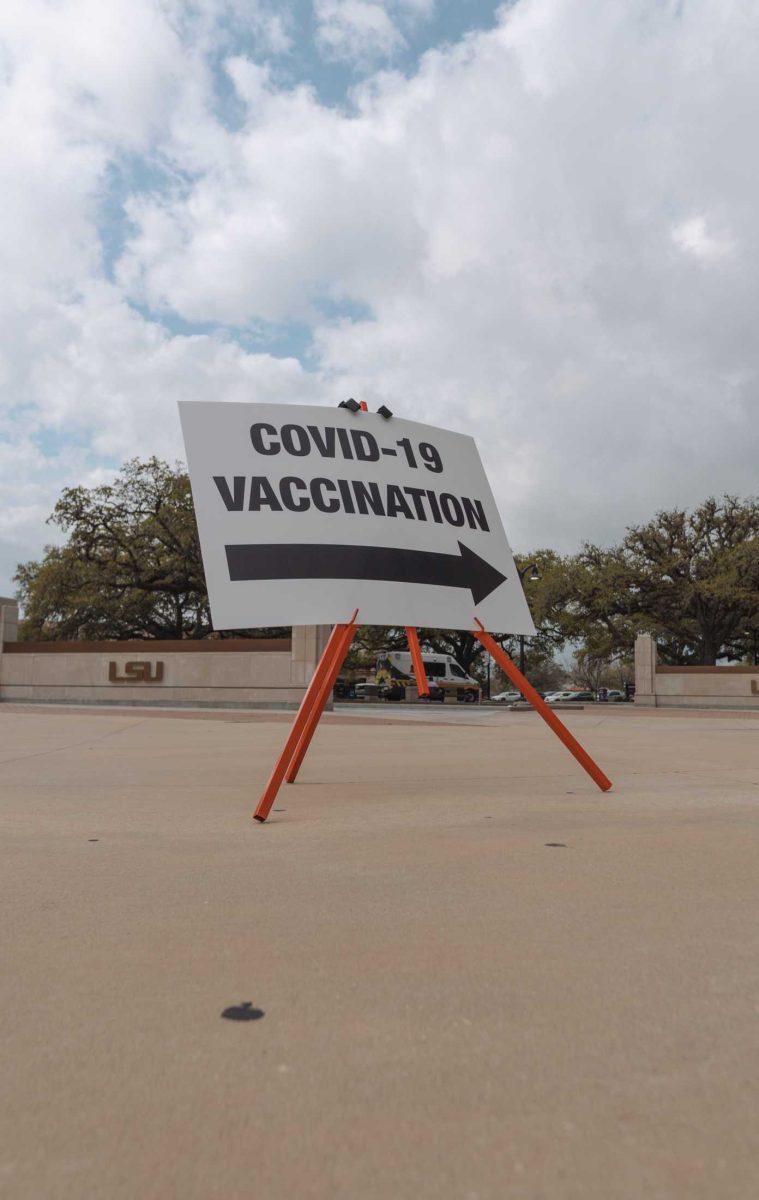
Matthew Perschall
A sign directs people toward the vaccination site on Mar. 14, 2021 at Tiger Stadium.
Top LSU administrators seemed reluctant to implement a vaccine mandate at a faculty Q & A meeting Thursday, while numerous employees voiced their outrage and concern at the possibility they would return to classes in the fall with students who were not vaccinated against COVID.
President Tate began the meeting by presenting both sides of the vaccination argument, saying LSU needed to respect each individuals’ choice.
“Chances are if you had the vaccine you’re probably one of the vocal ones calling for others to take it and have the vaccine be mandated,” Tate said. “You decided to mitigate your risk by assuming the risk of an acquired immunity and approach that has been approved on emergency basis.”
“Others in our community are applying their own risk mitigation strategy, and they’re willing to accept the risk of exposure and wait on FDA for approval before they accept vaccination,” Tate went on to explain. “The point is, people have their own risk mitigation strategies, and we have to respect that while preparing to lower our collective risk.”
Vice President of Legal Affairs and General Counsel Winston DeCuir spoke next, echoing similar key points. He focused heavily on giving faculty and students the freedom to choose their own medical treatment and how that merged with their constitutional rights.
“This COVID pandemic has caused every state school in this country to evaluate an age old question: When is government interference with a liberty interest justified?” DeCuir said, explaining that LSU has been reviewing the due process clause of the 14th Amendment since last March when the pandemic began. “The freedom to choose your own medical treatment is one of those fundamental rights in each decision we’ve made in this pandemic.”
Based on the nature of the intrusion and the severity of the potential outcome, DeCuir says LSU is not ready to mandate a vaccine because it could infringe on constitutional liberty interests. The Louisiana Department of Health (LDH), however, approved vaccine mandates at four private universities and said it does not distinguish between private and public institutions.
Faculty members brought up Indiana University as an example, saying that a judge upheld their vaccine mandate. Over 600 schools across the country have required at least one dose of the COVID vaccine.
Tate said the university will continue to “make the vaccine freely available for those who want it.”
Once the vaccine is taken off of emergency use authorization and fully approved by the FDA, LDH can add it to the schedule of seven other mandatory vaccines in Louisiana. Until then, LSU will implement advisory restrictions but will likely not mandate the vaccine. A final decision has not yet been announced but Tate said it would come by next week.
Representatives from LSU’s Health and Medical Advisory Committee spoke at the meeting, outlining their recommendations for the fall.
Masks and face coverings should be universally required indoors, including in all classrooms, as well as on campus transportation.
All on-campus residents should be required to get entry tested for COVID-19 prior to arriving on campus. Testing will also be required in residence halls when wastewater shows a high detection of the virus.
Physical distancing is strongly encouraged where masks are not currently required. This includes continuation of signage at entries and exits of classroom and buildings to discourage congregating in these spaces.
Because LSU is not able to mandate vaccinations due to state law, we must continue to strongly encourage all students to get vaccinated prior to arriving on campus. Those who have been vaccinated should self-report through the vaccination survey.
Appropriate quarantine and isolation protocols should be in place.
All classes should be recorded and available for students who may miss class due to COVID-19 related issues. This is to discourage ill individuals from coming to class.
All classrooms should have additional HEPA filtration installed prior to commencement of the semester (in process).
Continue to utilize the Daily Symptom Checker as a way of flagging potentially symptomatic individuals and providing testing direction.
These recommendations have not been approved by administration but are being taken into consideration, Tate said.
Many faculty members submitted questions in advance. Some voiced their concerns in the Zoom chat box. Concerns about returning to the classroom with unvaccinated individuals who could be spreading the virus were most prominent, but questions about sick leave and remote work were also raised.
No special provisions will be made for faculty or staff who have to quarantine or take off work to care for sick family members: They will have to use their normally allotted sick or annual leave. Remote work is a possibility, but not guaranteed. LSU, as a state institution, is following the model set by other government agencies, one administrator on the call said.
Tate concluded the meeting by thanking the faculty and staff for voicing their concerns, saying he and his administration would be reading the comments carefully and taking them into consideration.
“Prevention science, as most of us know focuses on evidence based strategies to lower risk, and to enhance protective factors,” Tate said. “While attaining and achieving the operational goals of the organization, I’m committed to taking the advice of this panel of great advisors who have epidemiological public health as well as biological emphasis biological backgrounds to apply them to help us achieve our organizational aims for the fall.”
